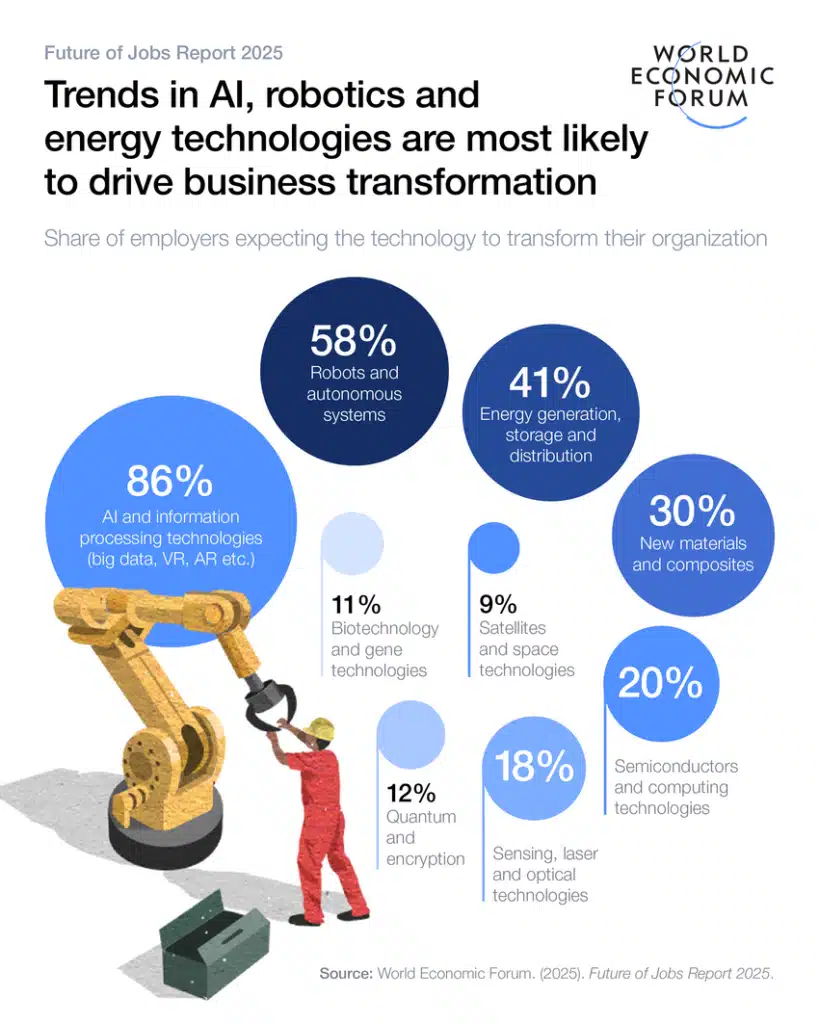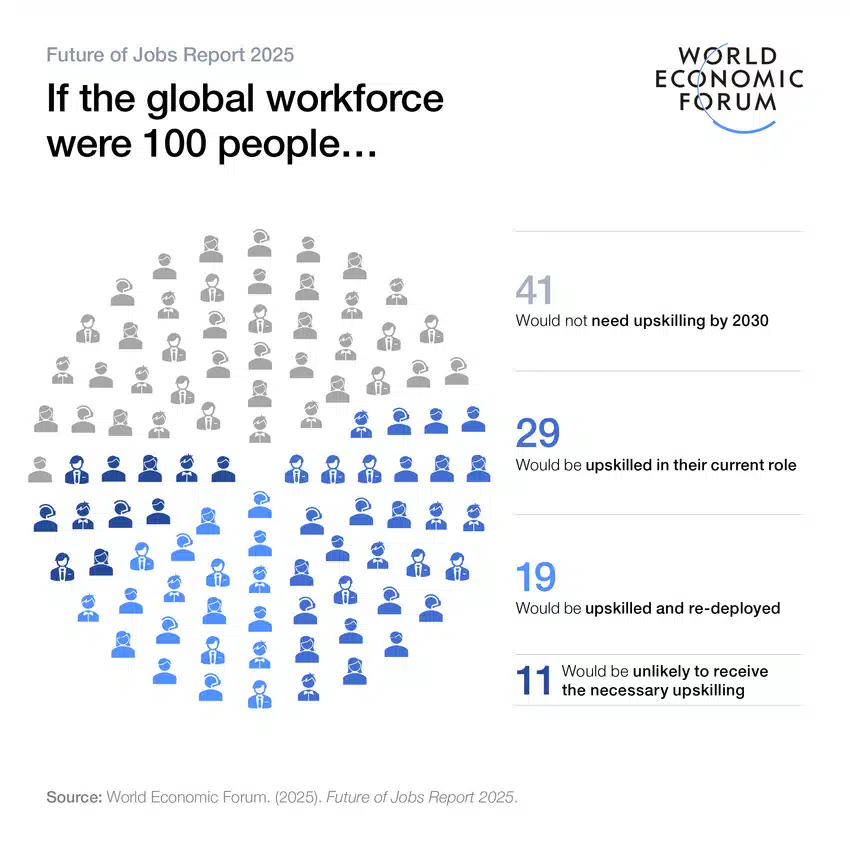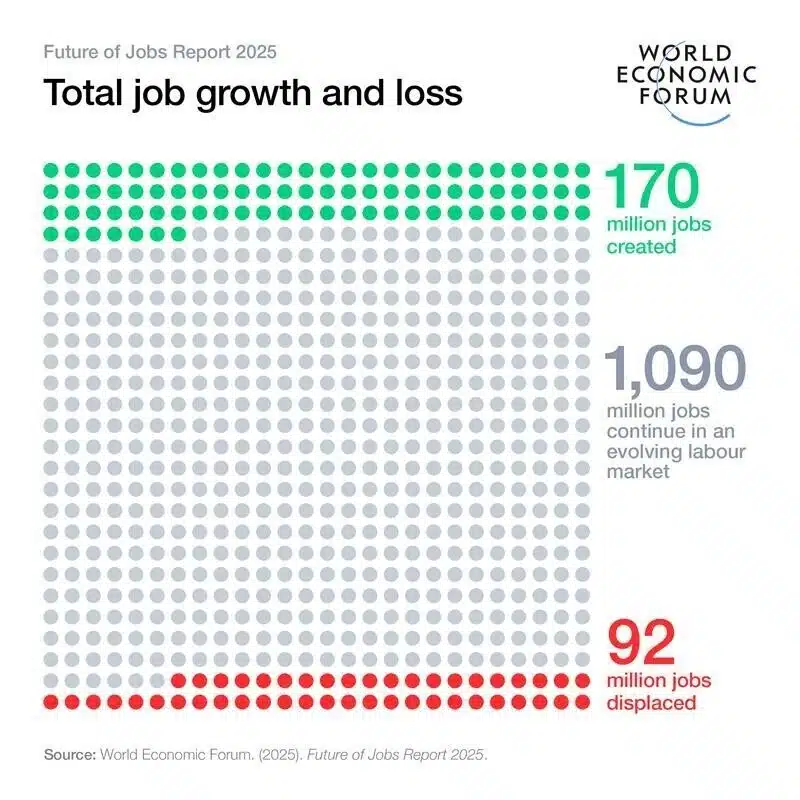According to the WEF Future of Jobs Report 2025, 22% of today’s jobs will be disrupted by 2030—with 170 million new jobs created but 92 million jobs displaced. The report provides an in-depth analysis of the said trends in the job market, emphasizing job growth, skill disruptions, and industry transformations. With the acceleration of automation; adaptability, continuous learning, and resilience are the fundamental components of workforce productivity. The future of work is all about proactive strategies to handle technological and economic disruptions.
This report is a must-have for employees, executives, business managers, government officials, and educators who want to be updated about the trends in the job market, be aware of changes in the skills required by companies and get prepared for the transitions in the industry.
This blog presents the report’s key insights, which concern job transformation and the necessity of specific skills for future success.
The role of technological advancements

Technology is still the primary factor driving a shift in the job market. Employers believe that expanding digital access will be the most disruptive trend. Around 60% anticipate it will impact their businesses by 2030. The primary technology advancements shaping the labor market are:
- Artificial Intelligence (AI) and Information Processing (86%): AI-based automation and data analytics are in the process of being reshaped into the industry, and thus, technology is responsible for generating new employment opportunities and renewable energy.
- Robotics and Automation (58%): The automation process leads to higher productivity, which can also imply job creation and deletion.
- Energy Generation, Storage, and Distribution (41%): This is a transition in the energy system from fossil fuels to renewables; therefore, more jobs will be created.
Although these trends will result in high demand for tech-related jobs, they will also lead to the demise of traditional employment. The future-proof skills in this field are AI and big data, networks and cybersecurity, and technological literacy.
The fastest-growing jobs
The rise of advanced technology and the awareness of climate change will affect job roles differently. We are taking a deep dive into this.
Top fastest-growing jobs by 2030
- Big Data Experts – The increased need for data-analytics skills stimulates demand for data-driven decision-support tools.
- FinTech Engineers – A la carte banking, cooperation, and solutions will be augmented by the growth of digital financial services.
- AI & Machine Learning Specialists – The growing adoption of AI in the healthcare, retail, finance, communication, and transport sectors will cause AI penetration.
- Software & Application Developers – Enhancing digitalization is the principal factor driving change.
- Security Management Specialists – The increased cyber-attack rate because social media, web applications, financial systems, and banking networks are connected to the Internet will increase security management.
- Autonomous & Electric Vehicle Specialists – EVs and automation will be expanding, and thus, designing electric vehicles will become a sought-after job.
- Renewable Energy Engineers – A positive development is that the global surge in renewable energy use propels sustainable job growth.
- UI & UX Designers – The transition from digital interfaces to digital experiences underscores the importance of designers focusing on the user experience and visual storytelling.
The skills employers are looking for

In 2030, 39% of the skills sought now will be outdated or deepened into new skills. It is more likely for this skill transition to occur more slowly than in previous years, implying that the adoption and workforce stabilization of technology are now at the same level. A summary of highlights:
Top in-demand skills for 2025-2030
- Analytical thinking – Problem-solving and critical analysis are still essential.
- Artificial intelligence and big data – Employers value employees with skills in both AI and data outcome analysis.
- Cybersecurity and network management – The necessity of safeguarding digital assets has become crucial.
- Creative thinking – Creativity and the ability to master new ways of doing things in an ever-changing world are the keys to success in life.
- Resilience and flexibility – The flexibility to navigate disruptions is essential for a successful and effective manager or employee.
To remain competitive, 59% of the global workforce will require upskilling or reskilling by 2030. Employers plan to:
- Upskill 29% of their workforce in their current roles.
- Reskilled and redeployed 19% of employees in new roles.
- Leave 11% of workers without reskilling, putting them at risk of job displacement.
Demographic shifts reshaping the labor market
Two major demographic trends are altering employment patterns:
- Aging Populations (mainly in high-income economies) – This drives demand for healthcare jobs, such as nursing and social work.
- Expanding Working-Age Populations (mainly in low-income economies) – This is increasing demand for education professionals, including higher education teachers.
These demographic changes highlight the need for skills in talent management, teaching and mentoring, motivation and self-awareness.
Employer strategies for workforce adaptation

According to the employer survey, 63% of businesses recognize the existence of skill gaps and their impact on business transformation. In addition, the businesses are:
- Re-emphasizing employee upskilling (85%)
- Recruiting of employees that have the necessary skills (70%)
- Migrating employees from the declining sectors to the expanding ones (50%)
- Trimming staff due to the redundancy of certain skills (40%)
Supporting employee well-being is also a key talent strategy, with 64% of companies focusing on mental and physical health to attract and retain workers.
The human-machine balance: automation vs. augmentation
A shift in the way of working is projected in this report:
- By 2030, 33% of tasks will be automated, up from 22% today.
- The use of AI will be more than just a replacement for humans, it will further enhance their capabilities.
- The IT, finance, and healthcare industries are predicted to adopt AI-driven automation with human oversight.
Also read: Stay relevant in the age of Artifiicial Intelligence
How does Online Manipal help in upskilling?
Online Manipal plays a significant role in helping professionals develop the required skills to be successful in the ever-changing employment market. Through a wide range of professional courses, the Online Manipal provides AI, data science, cybersecurity, fintech, and more that aligns with the most rapidly developing job sectors.
This platform offers flexible, self-paced learning, which makes it accessible to professionals as well as students. As a matter of fact, the curriculum is compiled together with the industry experts, due to which students can acquire practical, job-ready skills. Besides, Online Manipal supports learners by reskilling and upskilling to become more competitive, stay ahead, and adjust to the work market requisites of 2025 and onwards.
Also read: How working professionals are upskilling their careers with Online Manipal
Conclusion
By 2030, the job market will be completely different as it goes through technological change, the economy, climate issues, and the change in people’s demography. This will also lead to the creation of new job roles and will become a significant problem for employers and employees. Upskilling, reskilling, and adaptability will be the most important for the sustainable development of the workforce.
Along with handling the shifting trends, the companies should also aim to invest in the human resources and infuse AI, as well as the sustainability initiatives; even these will be the real determinant of the company’s future growth in a dynamically changing job market.
Prepare for your next career milestone with us















